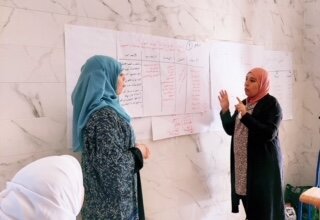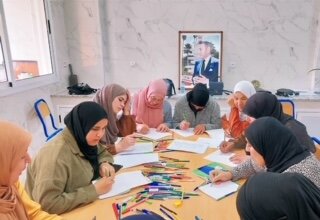By Houria Chouhab | HAF-F2F Field Officer
On the second day of the workshop, the empowerment leader was conducting an exercise related to Personal Power. The women had to close their eyes and imagine themselves in different rooms with different themes; then, they were requested to open their eyes and draw what they had imagined. One of the rooms is called A Room of Love, and there was this particular participant, Siham, who loves her husband and her four children. However, they were not with her in the imaginary room. Instead, she drew herself around a lunch table and was surrounded by her parents and siblings, with loads of red hearts above them all.
Later on, she explained that she misses her family and doesn’t get to see them often although they live in the same commune. She clarified that her husband doesn’t allow her to use public transportation and that he prefers to take her to wherever she wants to go, but he gets super-busy with work and doesn’t find time to drop her at her parents’ place. The facilitator suggested that she invite her mother to her house so she can get to spend time with her. She also advised her to have a wise and calm discussion with her husband over the matter to find suitable solutions for both. She mentioned that she loves her husband and he loves her back and that he is taking care of her the way he should, but it has always been a question of the Rif (Moroccan’s northern land) culture, where men are tough and strict when it comes to certain matters that concern the females in their families.
Siham further explained her drawing to the empowerment facilitator and said that even though she loves her husband and children, the last time she felt the warmth of love was before getting married. She continued explaining that she invests much time in making the family’s food and has to serve it separately. Her mother-in-law is a person with a disability and can’t leave the bed; therefore, she has to serve her food in her room.
She went on to say that when her husband arrives home, she serves him his food separately so as not to bother his comfort, and then comes the children's turn to be fed. When it is Siham’s turn to eat, she explains, she finds herself exhausted and with no appetite to eat alone. The empowerment facilitator thought that Siham does all this upon the request of the strict husband but her thoughts were wrong.
Since the first day of her marriage, Siham thought that it would be better to go for that eating process because she thought it was better for everyone. Today, Siham does not like this situation anymore and she wants to change it, but little did she know that the solution is in her hands. The facilitator suggested that Siham could feed her mother-in-law first, and then gather around one table with her husband and children. The solution was this simple, but Siham convinced her mind on the first day that things should be done differently so that she could not find this solution.
Siham’s eyes sparkled with joy when she imagined herself with her husband and children gathered around the lunch table.
By Karl Thomas Schloegel | F2F US Volunteer, HAF
By Yvette Broex | HAF Volunteer
Project reports on GlobalGiving are posted directly to globalgiving.org by Project Leaders as they are completed, generally every 3-4 months. To protect the integrity of these documents, GlobalGiving does not alter them; therefore you may find some language or formatting issues.
If you donate to this project or have donated to this project, you can receive an email when this project posts a report. You can also subscribe for reports without donating.
Support this important cause by creating a personalized fundraising page.
Start a Fundraiser
